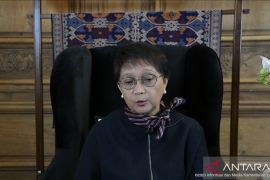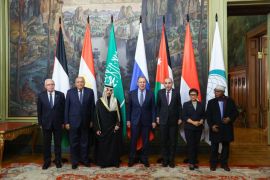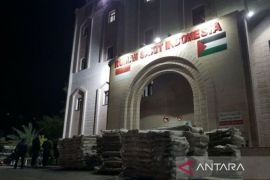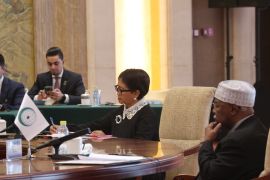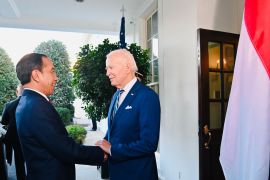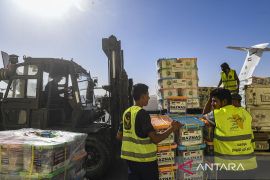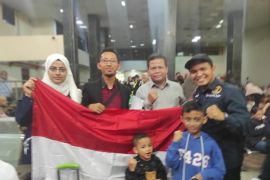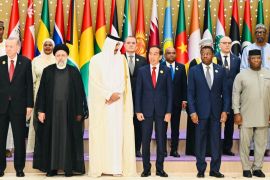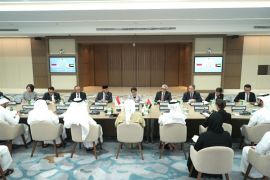Indonesia is a non-permanent member of the United Security Council (UNSC) for the 2019-2020 period and currently holds the UNSC chairmanship for the month of May 2019.
Indonesia, the world’s largest Muslim-majority nation, has outlined four priority issues and one special-attention issue during its UNSC membership starting January 1, 2019, and ending on December 31, 2020. The special issue is Palestine’s fight for freedom from illegal occupation by Israel.
On May 9, 2019, Retno Marsudi presided over a meeting, jointly held by Indonesia, Kuwait, and South Africa, that was attended by Palestine’s Foreign Affairs Minister Riyad Al-Maliki at the UN Headquarters in New York.
"The continued development of Israeli illegal settlements in Palestinian territories is unacceptable," she emphasized during the informal meeting of the Arria Formula themed "Israeli settlements and settlers: Core of the occupation, protection crisis and obstruction of peace."
The number of illegal Israeli settlements has grown steadily, from 110 thousand in 1993, to 620 thousand in 2017. This rising figure is a major impediment in the path to reaching a peace agreement between Israel and Palestine.
Nonetheless, in spite of the unfortunate situation, she expects no party to give up.
"The international community should not lose hope to resolve the Palestinian-Israeli conflicts through diplomacy and dialog, regardless of how challenging the situation is," she remarked.
The Arria Formula Meeting is informal in nature and held by the UNSC to scrutinize complex issues necessitating a breakthrough by inviting relevant experts and involving them in an interactive dialog.
The organization of the special meeting under Indonesia's UNSC Presidency exhibited its concern for Palestinian issues. The meeting was attended by UNSC members, other UN member countries, representatives of international organizations, and UN agencies.
“Today's meeting carries a very important theme on continued expansion of illegal Israeli settlements in the Occupied Palestinian Territory. The starting point for our deliberations is that continued expansion of illegal settlements is unacceptable. I repeat: unacceptable,” the minister reiterated.
The increasing number of Israeli illegal settlements and settlers indicates nothing but a clear and flagrant violation of international law and numerous Security Council and General Assembly resolutions. Thus, without doubt, the illegal settlements are at the core of the Israeli occupation, she remarked.
“It is at the heart of the protection crisis affecting the Palestinian people and a clear obstruction to peace. Hence, I believe this meeting should address two main issues, the first being how to stop the illegal settlements, and secondly, how to reverse the situation back to the lines of June 4, 1967, including with regard to Jerusalem,” she stated.
Indonesia has denounced the continual expansion of illegal settlements on three key grounds, the first undoubtedly being that it puts the two-State solution in jeopardy. These settlements apparently constitute a de-facto annexation and one of the key hindrances to the peace process.
The second vital point is that settlement activities are both a source of and pretext for other unlawful policies and human rights violations against the Palestinian people. They have been planned in a constant, strategic, and systematic manner and resulted in humanitarian disaster.
Thirdly, if remain unchecked, it may result in a vicious cycle of conflicts and violence.
“The Settlement issue is worthy of garnering the Council’s full attention. It’s action, or inaction, defines the credibility of the Council,” Marsudi noted.
Indonesia had earlier reiterated the need to adopt three key measures in a bid to solve the problems faced by the Palestinian government and people.
Firstly, the Indonesian government laid emphasis on the importance of providing protection to Palestinian civilians. Minister Marsudi cited the independent commission's report earlier this year indicating human rights violations by the occupying power, including violence against the media and health workers in Palestine. To this end, Marsudi reiterated the importance of offering international protection to Palestinian civil society.
Under the second measure, the Indonesian government also focused on the necessity to take concrete steps to tackle the humanitarian crisis in Palestine.
Finally, it has pushed for restarting the peace process between Israel and Palestine without further delay. Hence, it is necessary to promptly establish a credible peace process that guarantees equality for all parties in peace negotiations.
"The new perspective in the peace process does not mean overlooking the prevailing global parameters. For Indonesia, there is no other alternative than the two-state solution," Marsudi stated.
Meanwhile, Deputy Chairman of the Indonesian House of Representatives (DPR) Fahri Hamzah, at a meeting with Zuhair Rasyad, the Palestine National Council (PNC) representative, reasserted Indonesia's support for the Palestinians' struggle for independence.
Hamzah and several Indonesian members of parliament had visited Amman, Jordan, on May 26-29, 2019.
The Indonesian people and government will continue to extend their unwavering support to the struggle of Palestinians for the sovereignty of their country, Hamzah asserted.
All political parties' factions in the DPR too will offer their unstinting support to the Indonesian government's endeavors to free Palestine from Israeli colonialism, he remarked.
"The freedom of Palestine is an unpaid debt for Indonesia," he emphasized.
The PNC representative lauded Indonesia's staunch support extended to Palestine so far.
Editor: Bambang Purwanto
Copyright © ANTARA 2019

